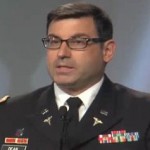
His kidney harbored a cancer and it needed to be removed. As a first year surgeon-in-training, I was consenting him for surgery at the Veterans Hospital in Philadelphia. Unlike most patients, he was unusually calm as I talked him through the procedure and its potentially life threatening complications. At one point, he gently put his hand top of mine, leaned over and said: “I trust you, Doc. Do whatever you have to do.”
He trusted me. I mean really trusted me. Not the kind of trust associated with borrowing someone’s car, or money, or counting on them to use protection. He trusted me with his life. After we finished talking, I grabbed his thick medical chart and read more about him. He had been a POW in WWII. As a form of torture, they had blindfolded him and put him in front of a firing squad. He remembered the bullets grazing his ears. Amazing. This soldier taught me very early in my career as a surgeon exactly what “trust” really means.
Got Your Back
It has been estimated that since 2001, 1800 wounded veterans sustained injuries that affect their sex lives and fertility. In war time operating rooms, quite often the first words uttered by recovering wounded veterans are“How’s my junk?” Yet, despite the huge effect these catastrophic injuries have on soldiers’ lives, societal taboos have prevented public discussion about them. Thankfully, this curtain of silence was first lifted in December 2014 at a conference in Washington DC entitled “Intimacy after Injury.” Since then, a bill was introduced in Congress in 2015 to provide infertility treatment that included assisted reproduction to disabled veterans. As a physician and surgeon dedicated to men’s health and a Veterans Hospital employee for over 2 decades, you can imagine my excitement (and support) when all this transpired. Well done!
And things are still rolling. This past fall, at our national fertility meeting, a former fellow of mine, Col. Robert Dean MD, Director of Andrology at Walter Reed Military Hospital, reported his ongoing work to preserve the fertility of catastrophically injured veterans. In several cases in which soldiers had lost both testicles to blast injuries, he was able to retrieve and freeze about-to-be-ejaculated live sperm from the surviving reproductive organs (seminal vesicles) in the body within days of injury. He received a standing ovation for his work.
As a men’s health specialist, what matters to our soldiers matters greatly to me. We need to earn the trust that they have so selflessly tendered to us.



